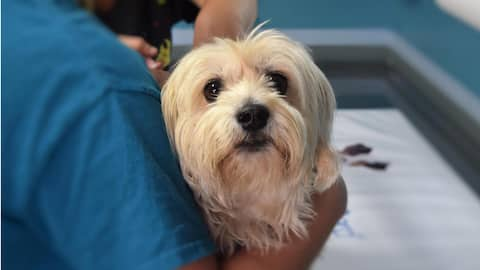Signs that indicate your dog needs a vet visit
What's the story
Since our pets can't communicate verbally, it is crucial to recognize signs indicating they need urgent medical care. By regularly checking your dog you can ensure any problems are picked up early and your beloved pooch gets the help they need. Dr. Ramesh K. Patil, an esteemed veterinarian with 60 years of expertise in pet healthcare shares his valuable insights with Newsbytes.
Signs
Important symptoms that indicate medical attention
Dr. Patil says, "Some notable indicators include changes in appetite, sudden dullness, lethargy, and alterations in behaviour such as decreased tolerance of the dog or withdrawal. It is essential to be attentive to changes in their water consumption, urination, and bowel movements as well." Note that some diseases cause dogs to develop unusual eating habits and increased water intake.
Physical symptoms
Physical symptoms warranting a vet visit
"Physical symptoms like persistent coughing, difficulty breathing, frequent vomiting, loose motions, limping, or any signs of pain, such as whining or reluctance to be touched, should not be ignored," warns the doctor. Rashes, lumps, or changes in coat quality, may indicate underlying health problems as well. He urges pet parents to monitor dogs' eyes, ears, and teeth for changes or foul smells.
Sutble signs
Subtle signs that warrant attention
While the obvious symptoms are hard to miss, pet parents may overlook some not-so-obvious signs. Dr. Patil says that some early indicators of health issues, include changes in sleep patterns, excessive licking or scratching, and alterations in hair coat. He recommends paying attention to disorientation, difficulty with balance, or changes in response to commands, as these could signal underlying medical issues.
Act
What to do when you notice these symptoms?
Pet parents should trust their instincts. "If they notice any of these signs or observe behaviours that seem unusual for their pet, it is best to consult with a veterinarian promptly. Early detection and intervention often lead to more effective and less extensive treatments," advises Dr. Patil. Regular veterinary check-ups are essential for preventive care and early detection of potential health issues.
Common illnesses
Common illnesses and preventive measures
Pet parents must be aware of health issues specific to their dog's breed. Dr. Patil elaborates, "Dogs are susceptible to various common illnesses, such as gastrointestinal problems, respiratory infections, and skin conditions. Preventive measures include vaccination, regular deworming, periodical checkup, maintaining a balanced and nutritious diet and regular exercise. Additionally, routine grooming and hygiene practices can play an important role in preventing skin-related issues."
